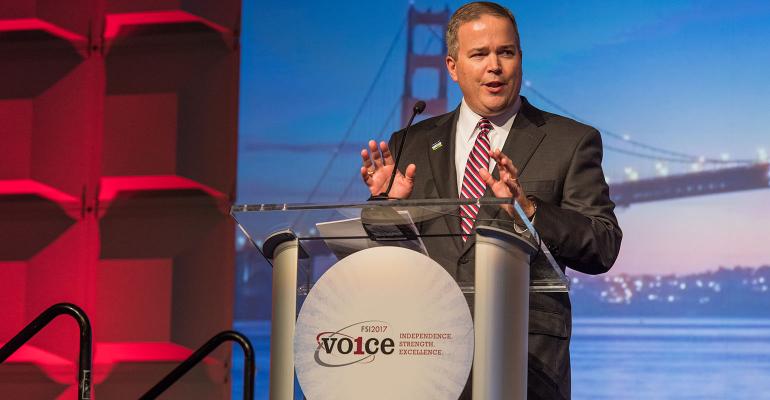If the Department of Labor’s fiduciary rule is delayed or repealed by an executive, legislative or judicial act, the independent broker/dealer industry must have a workable alternative to take its place, the Financial Services Institute said during its annual OneVoice conference in San Francisco on Tuesday.
“A delay is only that at this point—a delay; we must now convince the new Secretary of Labor and our allies in Congress to move forward with a workable alternative,” said Dale Brown, president and CEO of FSI. “If we achieve a delay or repeal of the rule through executive, legislative or judicial means, no one should expect that we’ll simply revert to the status quo. This fiduciary world is our new normal.”
Brown told b/d attendees that, if the rule is delayed, FSI will push for a new uniform standard of care that applies to all retail advisors—one developed by the Securities and Exchange Commission.
“FSI has been a clear, consistent advocate for a uniform fiduciary duty since well before Dodd-Frank,” Brown said.
In his first few days in office, President Donald Trump has issued a regulatory freeze, but it’s unclear whether that will apply to the DOL fiduciary rule. FSI believes this is the first of other steps that are in the works to delay the rule’s implementation.
The advocacy organization has been engaged at a high level with Trump’s transition team since his election in November. From those conversations, FSI has received the impression that they share the group’s concerns over the rule as it is written, its negative impact on client choice and access to advice.
“Since the fiduciary rule is not on the tips of most voters’ tongues, we knew we had to act swiftly and persistently,” Brown said.
In the past, FSI has had to take a defensive stance with regulators, but that’s starting to change.
“The unexpected changes in the political environment have given us what some have called a once-in-a-generation opportunity to advocate for a regulatory environment that reflects the future of the financial advisory profession, rather than defending how we’ve done business in the past,” Brown said.
The group has developed with a new strategic plan to make FSI more effective by deepening members’ engagement with elected officials and regulators and expanding its resources. The group currently has 40,000 advisor members, 114 firm members, and a $10 million budget.





